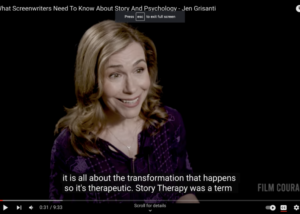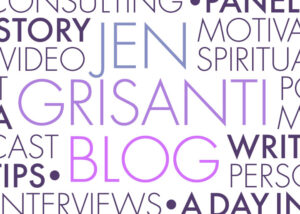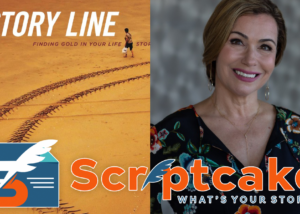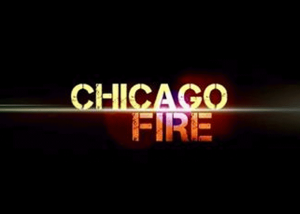I want to talk to you today not about writing stories, but about being story. Being story means taking action to shape the story of your own life. It means making that story the foundation that your work comes from. It means choosing to live the life you want
The inventor Buckminister Fuller said, “If you want to change how a person thinks, give up. You cannot change how another person thinks. Give them a tool the of use of which will gradually lead them to think differently.” Well, this weekend was all about gathering tools from all the classes that you took on story. When you leave, I want you to apply those tools not only to your writing, but also to your life.
What is more important than the story that you are living? If you spent as much time developing your own personal character arc as you do polishing your spec script, how would your life change?
A few years ago, I worked with a writer named Ryan. When he first came to me, he was part of a writing team. He and his partner were very talented, but they hadn’t sold anything yet. They had a manager, but not an agent. They had a gift but they needed to learn how to get their writing to a stronger place.
We worked together for a little while, we made some progress, and then Ryan got some bad news. His partner was dealing with some personal issues, and wasn’t going to be able to keep working on their collaborative projects. Basically, he was breaking up with Ryan.
This was a huge blow. They’d been on the verge of real success, and now Ryan felt like he was starting over from scratch.
Ryan was looking at this breakup as not just a setback but as something that was happening to him, something that he couldn’t control. And he wasn’t going to be able to move forward until he started to think of himself as the active hero of his own story.
Yes, he was going to have to work twice as hard from now on. Yes, he was going to have to rebuild his writing portfolio from the ground up. But the most important thing was, he was going to have to believe he could do it on his own. He had to choose to see this setback as an opportunity–as the beginning of a new story, with himself as the sole protagonist.
Once he made this mental shift, Ryan felt re-energized. He started writing a lot. We worked together on several more scripts, and I could see that his voice was actually even stronger on its own. What’s more, he started to take charge of his own career. He knew what he wanted, and he took decisive action to go out and get it. He took my Storywise 10 Week TV Writing Teleseminar, he got into Writers on the Verge, and he was wanted for the Warner Bros. Program, all in that same year. He landed a big agent. And today he’s a staff writer on “Chicago Fire.”
Ryan took a big setback and, instead of giving up and becoming a victim, he used that setback to drive him toward success. He let that problem inspire him to take action. He became the hero of his own story.
What if you could create the story you want to live by taking action? What if you could learn to become the active hero of your own story?
If you aren’t living the life you’d want to see on the page–if you’re not happy with the log line for your own biopic–what actions can you take to change it? What’s holding you back from taking those actions?
Many of us let failure or the fear of failure, hold us back.
What if you changed the way you view failure?
I want you to start seeing your falls and failures in a new light. I want you to look at your failures as a step toward success instead of a step away from it.
Failure is what makes us grow. When you fall, you learn what didn’t work. You took an action, and you didn’t get the result you wanted. Fine. Now you know what not to do, right?
When we fail, we grow. And when we grow, we move forward.
No hero succeeds right away. In any great story, each action the hero takes sets up a new obstacle. These obstacles escalate. Things keep getting worse. Finally, it looks like all is lost–until the hero turns things around and triumphs.
But that triumph wouldn’t have happened without the failures that went before it, right? Heroes learn from each obstacle they face. A hero has to keep focused on her destination, but she also has to learn from her journey, or she’ll get to the end of the story without the knowledge she needs to succeed.
When you choose to become your own hero, you choose to transform your failures into obstacles just waiting to be heroically overcome.
There are three key ingredients you’ll need for this kind of real-life heroic journey:
Belief;
Action;
And a Defined Goal.
Most of my friends would call me an optimist. And I think for the most part, that’s true. I’ve been working in Hollywood for 21 years. I’ve seen a lot of people’s dreams come true. I’ve seen a lot of magic happen.
But when it came to my own dreams, well, I just wasn’t quite as optimistic.
The legendary Aaron Spelling was my boss and mentor for 12 years. He was constantly telling me to write. Every time I turned in notes on a script or even wrote him a birthday card he’d say, “You should be writing.” But to become a writer, I’d have to leave the security of the executive world. That security was what I’d grown up with. It was what I knew. So the idea of leaving it to pursue the dream of writing terrified me.
I helped to launch a countless number of writing careers. I staffed over 15 top primetime shows. I saw what it was to go from non-working to being a working writer. The thought “what if” constantly filled my mind.
I knew how to do it. I just didn’t quite believe that I could.
It took a failure to light that fire of belief in me. I lost my job after 15 years with the same company. I felt like I was going through a second divorce. But recovering from that failure taught me how to redefine what I wanted, and take action to get it. I got where I am today by taking action to achieve a clear goal–but the very first step was igniting that belief in myself. The first step was for me to believe I could be the hero of my own story.
Of course, belief alone isn’t enough–you’ve got to carry it out. You’ve got to become the active hero of your own story.
Like TJ. TJ was one of my first clients when I started my consulting business. He was in his mid-thirties and already living one version of the American dream–steady job, nice apartment, loving fiancée. But he had another dream that was closer to his heart. His dilemma was, was his dream of becoming a writer worth leaving his safe, steady income?
TJ believed in himself. His writing was great. He had strong ideas and he knew how to execute them on the page. He just needed his actions to meet with an opportunity.
TJ referred his friend, Rasheed to me. We worked on several scripts together. Then, TJ told me that he and Rasheed had written a feature together and were contemplating the idea of writing TV together. TJ was a master of idea and structure. And Rasheed was great at character and emotion. We worked on several scripts together to build them a strong portfolio as a team.
We also had to figure out the right goal for them–they had to pitch the right kind of scripts. UTA loved their spec script for MAD MEN. They also liked their spec for FRIDAY NIGHT LIGHTS. But nothing quite clicked until they wrote their second pilot, which showcased both of their strengths–the emotional strengths Rasheed brought, and the creative ideas TJ came up with. After they pitched this pilot, UTA signed them. And four days later they were staffed on LIE TO ME.
I found out later that TJ had created a vision board for himself years ago, showing the house he wanted to be living in and the family he wanted to start with his then-fiancee. Well, he is living that vision now. His fiancée is now is wife. They have two kids and they live in the house from his vision board. And he got there through belief, decisive action, and a defined goal.
Becoming the hero of your own story will help you achieve your career goals. But it’s not just about external markers of success. It’s also about changing the way you see yourself and the events in your life. It’s about deepening the connection between your life and your work, so that you’re not just successful in your work, you’re fulfilled by it.
I worked with another writer named Brian who’d worked his way up to a pretty high rank in the military. That experience gave him the courage he needed to take action, and the discipline he needed to pursue his goals. But there was still something holding him back from totally throwing himself into this work.
His mother was dying of cancer. Now, I’m not saying he should have ignored that pain to focus on his work–far from it. I wanted Brian to take that pain and use it to fuel his writing.
For a while, he held that part of himself back. But after his mother died, something changed for him. He took that grief and put it on the page. He wrote from a truer and more honest place. Not only did his work get better and better, he felt more grounded in that work. He truly became the hero of his own story when he let that story incorporate all of himself.
Brian built up a really strong portfolio of smart, sensitive pilots and TV specs. He landed an agent. Then he got into Writers on the Verge. Finally, he staffed on ARMY WIVES–truly the perfect show for him. Now he’s staffed on a new NBC show, “Ironside.”
In each of the stories I’ve told you, our hero took a challenging situation and turned it into something positive. These heroes were fueled by belief, and they took action to achieve defined goals. They did the important emotional work on their life stories so that they had even more to draw on when they sat down to write. They became the active heroes of their own lives.
In the book Conscious Business, Fred Kofman, talks about four components of the journey to success: being, doing, having and becoming. He says, “Our attention is normally drawn to that which we can see (the effect), which obscures the importance of what remains hidden (the cause). We focus on results (the having) and forget the process (the doing) necessary to achieve those results.”
To me, this means you can’t focus too much on your destination. You’ve got to have a goal, but you need to keep eyes open on the way there. If you don’t, you’ll miss the chance to learn from the obstacles you hit on the way there.
If you believed in yourself and you took action to start that journey towards your goal, what’s the worst that could happen?
You could fail. But that failure won’t be the end of your story. When you fall, when you fail, you get new information about how to do what you’re doing better. Take it. Recognize that your failures move you toward success, not away from it. When you shift the way you see your pain, the creative world you’ve dreamed of can become a reality.
In my own life, the dream of being a writer became the reality of being the author of three books when I changed the way I looked at my pain. I realized that my falls gave me something to write about. My failures took me toward my dream, not away from it. Learning how to emotionally process those falls gave me the emotional fuel for my journey.
With belief, action, and a defined goal, you can make your dream a reality. You can turn your failures into obstacles on the way to success.
This is the most important story you will ever write: your own story. Learn to be in your story. When you write your own life story, we will see the real you in your writing. And that’s what any audience wants: We want to see you be story.







Excellent items from you, man. I have bear in mind your stuff previous to and you’re simply too excellent.
I actually like what you have bought here, certainly like what
you are stating and the way through which you are saying
it. You’re making it entertaining and you continue to take care of to keep it sensible.
I can not wait to learn far more from you. That is really a terrific web site.
Kassie, Thank you so much for your comment on my website. I am grateful! Kindly, Jen
William,
Thank you for your comment on my article, BEING STORY. I am grateful.
Wishing you well!
Kindly,
Jen